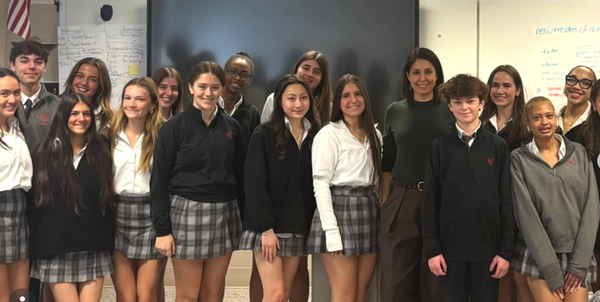Teacher Spotlight: Mr. Macklin on his time in the Peace Corps

We often say to ourselves that we have all the answers, that we know how to fix the problems, but the fact of the matter is that until you’ve lived in [poverty], until you understand it, you don’t understand or know what [other people] need.
This is the lesson that Mr. Macklin learned during his time in Senegal as an Agroforestry Volunteer in the Peace Corps. Serving in the Peace Corps is a 27-month volunteer commitment, which includes language training and living with a host family. Mr. Macklin’s experience in the Peace Corps was instrumental in shaping his understanding of poverty, community, and own role in the world.
Senegal is a small, developing country in West Africa with a population of about 16 million. Almost 40% of its population lives on less than $1.90 a day, and its GDP per capita is only $1033. Senegal has a primarily agricultural economy and is already suffering the effects of climate change. While Senegal has some large cities, like its capital, Dakar, Mr. Macklin lived in a small, rural village of about 3,000. His village struggled in particular with a lack of access to clean water.
As a member of the Peace Corps, Mr. Macklin lived alongside other members of his community, eating the same daily meals of rice and maafe, a peanut and tomato stew, as they did, and speaking Wolof, the local language. “They knew you weren’t an outsider,” he said, and this integration into his community gave him the chance to understand the needs of his neighbors.
In his village, the type of poverty Mr. Macklin witnessed is symptomatic of what he calls” poverty by exclusion.” He attributes this to a lack of dialogue and communication. “I don’t think anyone really went to go and talk to [the people in the village] and see what they needed and what they wanted,” he said. “They know what they need better than we do, and the only way to understand their needs is through dialogue — an essential aspect of the Peace Corps’ mission.”
Something that stood out to him during his service was that his village emphasized the well-being of the community over that of any individual. “I had never seen it on that kind of a level before, so it was really incredible to see a community of people saying ‘we are community first, we are about others,’” he said.
His experience in Senegal, of community and culture, of poverty, and of shared understanding, ultimately helped him recognize that “every benefit, every gift that I’ve been given isn’t a gift for me, it’s a gift to be shared with other people,” — a lesson he hopes to pass on to his students.
Mr. Macklin hopes that Poverty Education Week encouraged members of the SJC community to more than anything just engage and ask questions.
“Whenever you ask these questions,” he said, “you’ll find that the answers are a lot more human, and a lot more easily accomplished than you would expect.”
In situations of poverty, people generally need shelter, food, love, support, and comfort, he explains. “We can provide these things…there’s never an ask beyond our reach as long as we’re asking the right questions, engaging in conversation, and not thinking that we know better than others.”




